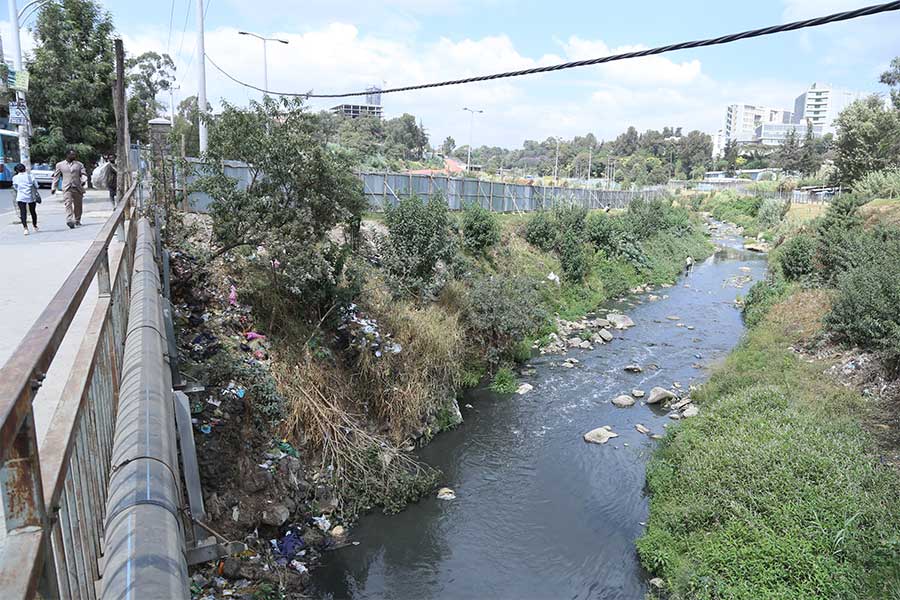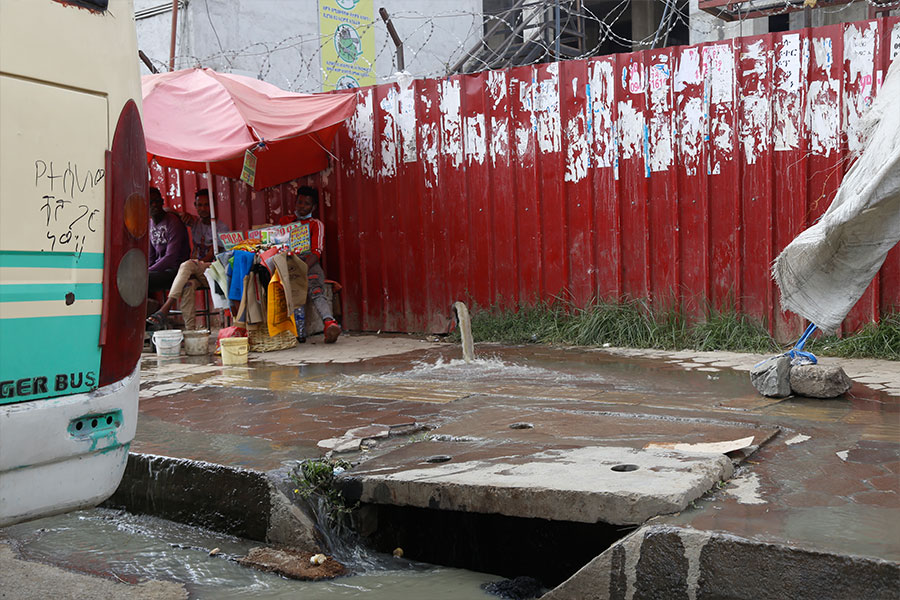
Fortune News | Jan 19,2019
Jul 18 , 2021
By Abdulmenan M. Hamza
Ethiopia's bureaucracy is politicised and has as its modus operandi party loyalty over merit in hiring and promotions. The Homegrown Economic Reform plan rarely touches upon this issue, despite the urgent need for consideration, writes Abdulmenan Mohemmed (abham2010@yahoo.co.uk), a financial analyst with over two decades of experience.
An editorial on this publication, headlined "Absent Competent Bureaucracy, Economic Policies Get Stuck," [Vol. 22, No. 1106, July 11, 2021], highlighted the need for a competent bureaucracy to successfully implement economic policies. It remains to be an issue that is overdue to be seriously considered by the government.
Whether a country pursues a developmental state paradigm or a liberal capitalist system, the success of government economic policies depends on the state's autonomy and competency in implementing them. How far autonomous and capable the state’s bureaucratic apparatus could be depends on the country's specific context. In a nation where the liberal capitalist system dominates, the bureaucracy can be close to a Weberian model, an independent arbiter between the government and the market forces.
During their economic miracle in the second half of the 20th century, the developing states in Southeast Asia had an economic bureaucracy termed by Peter Evans, political economist, as an "embedded autonomy.” It refers to a state apparatus with a web of close relationships with the private sector to support development and maintain its independence against capture by interest groups. The autonomy of the state in those countries was not only against the private sector but also shielded from politicisation.
Ethiopia's bureaucracy has strange features as it has drawn a cocktail of elements from here and there. In the 1990s and 2000s, civil service reforms were introduced to professionalise state services, but there was barely any emphasis on autonomy. With the emergence of the developmental state economic model in the middle of the 2000s, the bureaucracy has been increasingly politicised. This was contrary to the bureaucratic apparatus of the developmental states in Southeast Asian countries at the time of their economic miracles.
With a politicised bureaucracy, the modus operandi is party loyalty over merit in hiring and promotions. With the formation of Prosperity Party, this situation has continued, if it has not gotten worse. The little emphasis given to this issue in the Homegrown Economic Reform plan makes one wonder how far this reform can go.
Even though Ethiopia's bureaucracy is free from the influence of the private sector and its operation has expanded over the years, the mingling of the party structure and state apparatus has undermined its efficiency and effectiveness. This has even affected the institutions reputed for a modicum of technocracy, such as the Central Statistical Agency (CSA) and the Finance Ministry. The politicisation also extended to the operations of the state-owned enterprises (SOEs).
These developments, combined with the government's increasing involvement in the economy, have created a situation where the boundaries between party, state and market have blurred. The implications of this are unaccountability, incompetence, sloth, wastage of resources and corruption. Notable examples are the disastrous failures of the sugar projects under the Metal & Engineering Corporation (MeTEC), and the staggering accumulation of non-performing loans at the Development Bank of Ethiopia (DBE). Not to mention the massive credit exposure of the Commercial Bank of Ethiopia (CBE).
A successful relationship between the state and the private sector is essential for economic growth. Yet, the terms upon which this relationship is founded requires proper consideration. Establishing close ties with the private sector while maintaining bureaucratic autonomy fosters a cooperative approach to problem-solving. In Ethiopia, although the independence of the state apparatus from the private sector’s influence is laudable, the way the relationship between the two has been framed has had severe repercussions.
As the state saw the private sector with suspicion, its approach has often been to curb its power while needing the private sector’s support for its development agenda. A good example is the lengthy bickering between the authorities and the private sector during the reconstitution of the commerce and sectoral associations' chamber system in the mid-2000s.
It brought chambers that had enjoyed considerable freedom in the 1990s and early 2000s under the fold of the state. It caused their disintegration and failure to represent the private sector in an organised and formal manner. The outcome was personal relationships between businesses and state officials flourishing, and opening the floodgate of corruption and malpractice in the place of organised and formal ways of problem-solving.
Now, the bureaucracy is entrenched with a class that has its own interests in maintaining the status quo – living off corruption, malpractice, waste, and sloth. What makes reforming the bureaucracy difficult is that it has connected with the political establishment in a web of networks. Disentangling the state structure from party requires considerable commitment, wisdom, and time. Nevertheless, it should be done as a matter of urgency.
This does not mean instituting a Weberian style of bureaucracy across the state structure, which is impractical. But, to start with, pockets of the state apparatus which deals with economic matters, both budgetary and profit-making, can be reformed for economic policies to be successfully formulated and implemented. This can be achieved through instituting institutional autonomy and accountability, avoiding undue political interferences, establishing competitive and meritocratic employment and promotion, designing competitive pay packages, and appropriate media and political scrutiny.
PUBLISHED ON
Jul 18,2021 [ VOL
22 , NO
1107]


Fortune News | Jan 19,2019

Radar | Jun 05,2021

Radar | Nov 30,2019

In-Picture | Feb 08,2020

Radar | May 25,2019

Radar | Mar 21,2020

Viewpoints | Jan 13,2024

Radar | Mar 23,2024

Radar | Apr 17,2021

In-Picture | Apr 13,2025

My Opinion | 132041 Views | Aug 14,2021

My Opinion | 128437 Views | Aug 21,2021

My Opinion | 126364 Views | Sep 10,2021

My Opinion | 123984 Views | Aug 07,2021





Dec 22 , 2024 . By TIZITA SHEWAFERAW
Charged with transforming colossal state-owned enterprises into modern and competitiv...

Aug 18 , 2024 . By AKSAH ITALO
Although predictable Yonas Zerihun's job in the ride-hailing service is not immune to...

Jul 28 , 2024 . By TIZITA SHEWAFERAW
Unhabitual, perhaps too many, Samuel Gebreyohannes, 38, used to occasionally enjoy a couple of beers at breakfast. However, he recently swit...

Jul 13 , 2024 . By AKSAH ITALO
Investors who rely on tractors, trucks, and field vehicles for commuting, transporting commodities, and f...

Jul 12 , 2025
Political leaders and their policy advisors often promise great leaps forward, yet th...

Jul 5 , 2025
Six years ago, Ethiopia was the darling of international liberal commentators. A year...

Jun 28 , 2025
Meseret Damtie, the assertive auditor general, has never been shy about naming names...

Jun 21 , 2025
A well-worn adage says, “Budget is not destiny, but it is direction.” Examining t...

Jul 13 , 2025 . By YITBAREK GETACHEW
The Addis Abeba City Revenue Bureau has introduced a new directive set to reshape how...

Jul 13 , 2025 . By BEZAWIT HULUAGER
Addis Abeba has approved a record 350 billion Br budget for the 2025/26 fiscal year,...

Jul 13 , 2025 . By RUTH BERHANU
The Addis Abeba Revenue Bureau has scrapped a value-added tax (VAT) on unprocessed ve...

Jul 13 , 2025 . By NAHOM AYELE
Federal lawmakers have finally brought closure to a protracted and contentious tax de...